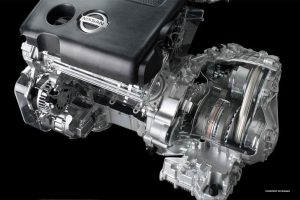Reliability. Safety. Innovation. Those are just a few of the positive associations linked with Japanese automobile manufacturer Nissan. The company is well-known for making vehicles that are generally reliable and long-lasting. However, Nissan cars aren’t perfect. In fact, many models have had recurring issues with their CVT transmission systems.
This guide will list the Nissan cars that can have these issues, as well as exploring how and why the CVT problems occur in the first place.
List of Nissan Cars with CVT Problems
Before we look at the nitty-gritty of the CVT issue, here’s a list of all Nissan vehicles known to be affected:
- Altima
- Juke
- Maxima
- Murano
- Pathfinder
- Quest
- Rogue
- Sentra
- Versa
- Versa Note
As you can see, the problem is quite widespread, affecting multiple Nissan models. Even some of the brand’s most popular and highly-rated cars have encountered these CVT problems, and the issue goes back as far as 2004.
In other words, this is quite a major and long-running issue. Nissan has even faced class action lawsuits from its customers over the problem. Many models and units have been affected, with those produced between 2003 and 2017 being the most likely to suffer. Anyone buying a used Nissan should therefore think carefully before investing in one of these particular models.
What Is the Nissan CVT Issue?
Here’s a primer for those unfamiliar with this issue. Since the early 2000s, Nissan has released many vehicles with CVT, or continuously variable transmission, systems. While standard transmissions shift between a range of fixed gears, CVTs don t have the same fixed gears. Instead, they use a system of to continuously shift between various gear ratios while the car is in motion.
In theory, CVT transmissions are quite beneficial. They can improve fuel economy, make it easier to drive uphill, and provide a smoother, more comfortable ride. A lot of other manufacturers make use of them, with varying degrees of success. However, for one reason or another, the system that Nissan has used for many years hasn’t quite worked as intended.
In countless cases over the last couple of decades, Nissan drivers have encountered issues with their CVT transmissions. One of the most recurrent is when the transmission fluid overheats, which can cause the car to effectively lose power or stall. This can be dangerous for drivers to deal with, and faulty CVTs are often costly to fix.
What Are the Signs and Symptoms of a Bad CVT?
A faulty or failing Nissan CVT can cause a range of problems for drivers. Fortunately, this issue is quite easy to spot, as the symptoms tend to be noticeable.
Shuddering
One of the most common symptoms of a faulty CVT is when the car shakes and shudders. This isn’t just uncomfortable, it can be scary for drivers and passengers alike. It most commonly happens while driving at low speeds, or when pulling away from a stationary position.
Burning Smell
As explained above, a big issue with the Nissan CVTs is that they’re prone to overheating. Too much heat causes the transmission fluid and surrounding components to potentially give off an unpleasant burning smell. Usually, that smell is strong enough to detect from within the vehicle. If you smell it, it’s best to pull over safely as soon as you can and give your car time to cool off.
Strange Sounds
It’s not just smells you have to watch out for. Faulty CVTs also emit weird noises, too. These types of transmissions are louder than traditional ones by default, and they can start to whine and grind when things go wrong. Usually, those kinds of sounds mean that one of the internal parts, like belts or bearings, have worn down or slipped out of position.
Fluid Leaking
Many Nissan owners have also reported transmission fluid leaks. Of course, transmission isn’t the only fluid that might leak out of your car. But it’s quite easy to spot, as it tends to be bright red in color, with a distinct oily smell. If you spot any pink or red marks or pools on your driveway – or wherever you park your car – you may have a leak.
Hesitation
Hesitation is a tricky symptom to describe, but drivers tend to know it when they experience it. It usually occurs when shifting from park into drive or into reverse. It feels like the car is delayed, somehow, or that it takes longer than it should to accept the gear change and start moving. In general, it makes cars much more frustrating to operate, and it’s a clear sign of transmission issues.
Loss of Power
Last but not least, you might also experience partial or total loss of power to your car because of the Nissan CVT issue. If the transmission gets too hot and doesn’t have chance to cool down, the car may eventually just shut itself down to avoid further damage. This results in random stalls or sudden loss of power and speed while driving.
FAQs
Has Nissan done anything to address the CVT issue?
Yes, in response to the many customer complaints – as well as the lawsuits brought against the company – Nissan decided to make a few changes. It extended the warranties on CVT transmissions produced during the most problematic years, ensuring that users can get them repaired for free. The extended warranties apply to cars made between 2003-10 and 2012-17.
Are new Nissan cars still being made with CVT transmissions?
They certainly are. Despite all the furor and legal trouble that Nissan has faced regarding CVT transmissions, the company has continued to use them in its latest releases. For example, recent models of the Rogue, Rogue Sport, Murano, Versa, Sentra, Altima, Maxima, and Kicks all come complete with CVT transmissions. However, CVTs aren’t present in the latest Nissan trucks or SUVs.
Choose Your Nissan with Care
As you can see, a lot of Nissan cars have CVT transmissions fitted which can cause problems for owners. Of course, some drivers don’t notice any problems at all, but others have to deal with a lot of frustration and expense when issues arise. To avoid falling into that latter category, drivers should be careful about which Nissans they buy.



